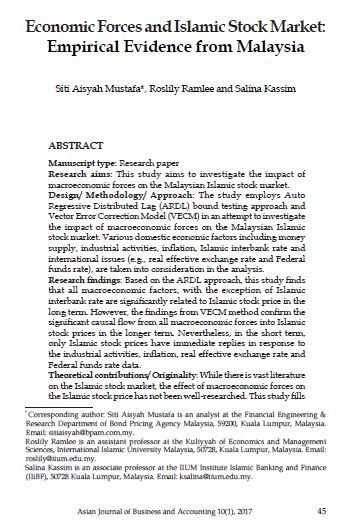Economic Forces and Islamic Stock Market: Empirical Evidence from Malaysia
Main Article Content
Abstract
Manuscript type: Research paper
Research aims: This study aims to investigate the impact of
macroeconomic forces on the Malaysian Islamic stock market.
Design/ Methodology/ Approach: The study employs Auto
Regressive Distributed Lag (ARDL) bound testing approach and
Vector Error Correction Model (VECM) in an attempt to investigate
the impact of macroeconomic forces on the Malaysian Islamic
stock market. Various domestic economic factors including money
supply, industrial activities, inflation, Islamic interbank rate and
international issues (e.g., real effective exchange rate and Federal
funds rate), are taken into consideration in the analysis.
Research findings: Based on the ARDL approach, this study finds
that all macroeconomic factors, with the exception of Islamic
interbank rate are significantly related to Islamic stock price in the
long term. However, the findings from VECM method confirm the
significant causal flow from all macroeconomic forces into Islamic
stock prices in the longer term. Nevertheless, in the short term,
only Islamic stock prices have immediate replies in response to
the industrial activities, inflation, real effective exchange rate and
Federal funds rate data.
Theoretical contributions/ Originality: While there is vast literature
on the Islamic stock market, the effect of macroeconomic forces on
the Islamic stock price has not been well-researched. This study fills in the gap by investigating the relationship between macroeconomic
variables and Islamic stock price.
Practitioner/ Policy implications: The findings demonstrate that
investors and policymakers should take into account the fluctuations
in the macroeconomic variables since they have high information
content regarding the future movements of Islamic stock price. The
foreign factors, in particular, depict stronger influence on the Islamic
stock market than the domestic factors.
Research limitations/ Implications: Cheaper currency would
accelerate export sector and recovery of the U.S. economy might put
Islamic stock market at disadvantage because there is possibility that
international investors will switch back their investment.
